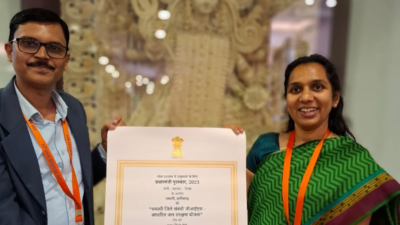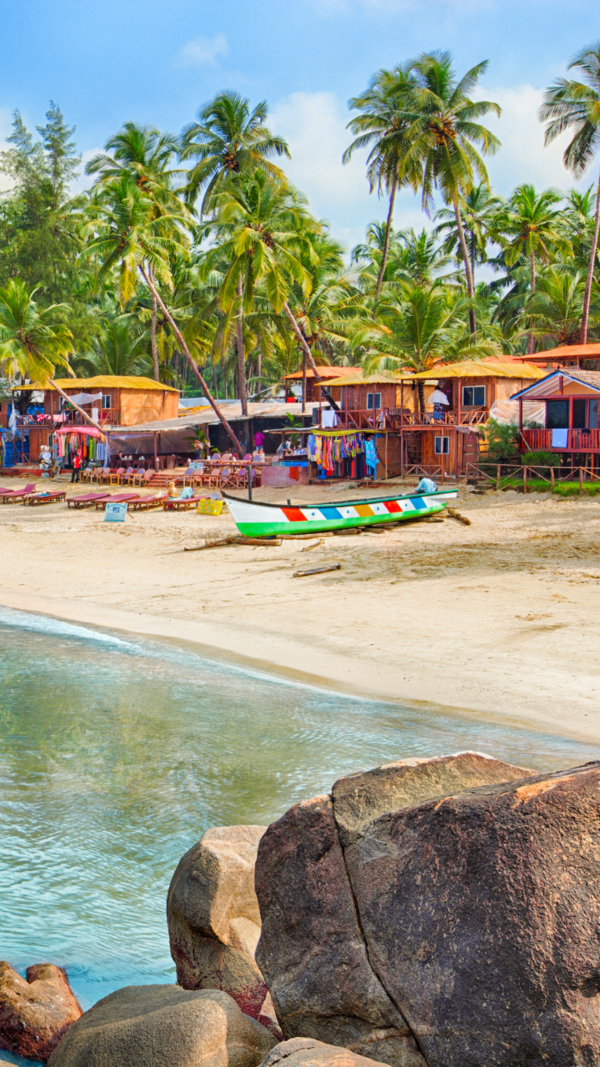- News
- City News
- raipur News
- Chhattisgarh’s Dhamtari district earns PM's award for GIS-based water conservation plan
Trending
Chhattisgarh’s Dhamtari district earns PM's award for GIS-based water conservation plan
Dhamtari district in Chhattisgarh has been awarded the Prime Minister's Excellence Award 2023 for its innovative GIS-based water conservation plan. The initiative revitalized water structures, created new Amrit Sarovars, and enhanced agricultural potential through data-driven planning. Despite challenges like declining water tables, the district implemented measures such as crop diversification and industrial compliance to promote sustainable water management.
RAIPUR: Dhamtari district in Chhattisgarh has received the Prime Minister's Excellence Award 2023 in the Innovation category for its GIS-based water conservation plan. This multi-layered initiative has significantly improved water management across the district.
The project focused on revitalising existing water structures and implementing targeted interventions, resulting in the creation of 26 new Amrit Sarovars, 156 rainwater harvesting structures, and enhanced agricultural potential over 472 acres.
Using GIS technology, customised maps were developed for each panchayat, enabling data-driven planning and the strategic development of essential water infrastructure at the grassroots level. These efforts, led by then District Collector Namrata Gandhi, improved water availability and empowered local communities with sustainable water solutions.
A comprehensive GIS-based framework, developed with technical support from Upendra Singh Chandel, District Informatics Officer, NIC Dhamtari, transformed the district’s approach to water conservation. The framework integrated data from the Jal Doot App, the Central Ground Water Board (CGWB), INDIA WRIS, and NIT Raipur survey data.
A GIS-enabled Water Body Inventory—developed using satellite imagery and drone surveys—was created to monitor the health, encroachments, and conservation status of water bodies. Mobile apps were launched to crowdsource water conservation efforts during the Jal Jagar Mah Utsav, with real-time tracking made possible through GIS dashboards.
Despite these achievements, Jal Doot App data indicates a declining water table, driven by over-extraction for 60,000 hectares of summer paddy and over 32,000 borewells. As of March 2023, 98 gram panchayats reported spot source failures under the Jal Jeevan Mission (JJM). Falling reservoir levels and rising water scarcity remain pressing concerns.
To address this, a 24x7 JJM call centre was launched in March 2024. Of the 732 complaints received, 663 were resolved, showing a marked improvement in public service delivery.
Under Gandhi’s leadership, the district shifted from infrastructure-heavy methods to behaviour-driven, sustainable practices. These included promoting crop diversification—from summer paddy to millets and pulses—and encouraging rooftop rainwater harvesting in urban and industrial areas. A platform called SATHI was also launched to foster collaboration between civil society and government.
A workshop conducted by the CGWB brought together departments such as Public Health Engineering (PHE), Agriculture, Forest, Urban Development, and MGNREGA to map recharge zones and plan interventions like subsurface dykes, percolation tanks, and more Amrit Sarovars. It also aimed to link urban rooftop harvesting systems to alluvial recharge zones and address causes of spot source failures, including poor recharge and water divide locations.
Industries were mapped against local groundwater levels, revealing widespread non-compliance with CGWB norms. Following a directive from the Collector, flow meters were installed, and 198 rooftop rainwater harvesting systems in industrial areas were renovated. As a result, 136 notices were issued, and 99 industries applied for usage permissions. A single-window system under the General Manager of the District Industries Centre (GMDIC) was introduced to support compliance.
The Clean Gangrel Campaign in February 2024 saw 29 organisations collect 35 mini-truckloads of plastic waste. Proposals have been submitted for an eco-tourism plan and a single-use plastic ban around the Gangrel reservoir. The NHAI, SECR, and ADB collaborated to connect excavation activities to Amrit Sarovar construction—102 have been completed, and 12 are in progress. Injection wells were included in road projects within recharge-deficient zones—66 planned, 17 completed.
Gandhi’s approach reflected convergent governance, scientific planning, and community engagement. Her tenure as Collector made Dhamtari a national model in water conservation, earning the Prime Minister’s Excellence Award 2023.
Now posted as Deputy Secretary at the Cabinet Secretariat, Government of India, Gandhi’s leadership in Dhamtari was marked by innovation, inclusivity, and a commitment to public service.
End of Article
Follow Us On Social Media










